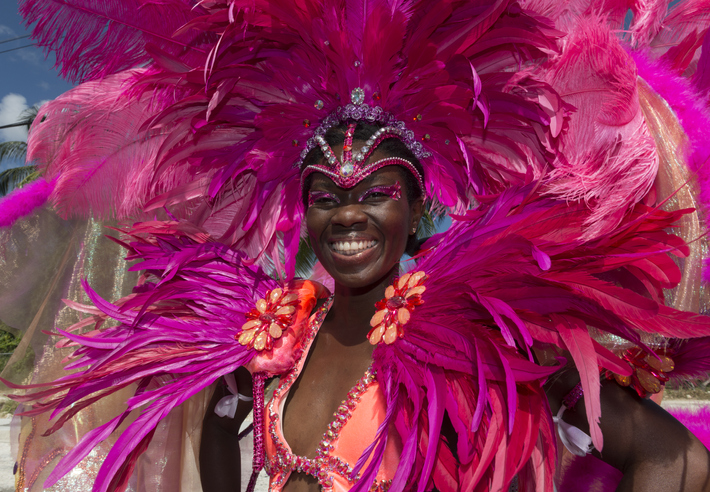Celebrating Carnival Across the Caribbean
by Karen Rollins Sep 28, 2020

The Caribbean is the unofficial home of carnival.
Carnival is tied to our history, and is an integral part of our culture, fusing deep-rooted connections to Africa, Europe, religion and freedom with more recent traditions and rituals.
If you’re a carnival fan, the region is the perfect place to party for days. Most islands have an annual street celebration, and each one has a different flavour.
Antigua and Barbuda
Antigua’s ‘Greatest Summer Festival’ has come a long way since it was first staged in August 1957 to attract tourists and commemorate Emancipation Day.
It now features weeks of activities for people of all ages including an opening day parade, pageants, a T-Shirt Mas, calypso competitions, and several fetes.
Most of the action takes place from the end of July to the first Tuesday in August.
Aruba
Aruba’s ‘Carnaval’ is believed to have its roots as far back as the 1920s when social clubs on the island staged costumed celebrations to mark seasonal festivities.
Around 1954 the social clubs organised the first Carnival Queen Election as well as a single grand carnival parade in Oranjestad, featuring floats, costumes and steel pan bands.
Today, Aruba’s carnival has evolved to include beauty pageants, music competitions and street parties. The final act of the season is the midnight burning of the life-size effigy of Carnival – King Momo.
Bahamas
Junkanoo Carnival in the Bahamas is an energetic collection of concerts, competitions, cultural shows, and street parades.
Pieces of Bahamian culture and heritage are woven together to form a heart-pumping series of entertaining events which have a different theme every year.
Billed as the only carnival in the world that takes place on a beach, this event is highly anticipated and well supported by locals and visitors alike.

Barbados
Barbados is home to one of the most colourful, exciting and creative Carnival’s in the Caribbean known as Crop Over.
The Crop Over Festival, a cultural celebration of the country’s 200-year-old association with the sugar industry, is six-weeks of fetes, soca and calypso competitions, and street fairs involving endless amounts of food, drink and dance.
The culmination of Crop Over is a massive street party on Grand Kadooment Day (the first Monday in August).
Hundreds of costumed revellers ‘jump-up’ behind thumping music trucks, and slowly make their way down one of the island’s main highways, before partying into the night.
Carriacou
Celebrated on 24 and 25 February, Carriacou’s Carnival Monday and Tuesday is a truly unique experience – surely no other event involves reciting Shakespeare in the streets!
The Shakespeare Mas or ‘Pierrot’ is reminiscent of the colonial period and involves a brightly dressed, white-masked character modelled after plantation owners.
The pierrots ‘face-off’ and recite lines from Shakespearean plays.
The goal is to be as accurate as possible because anyone who says a word wrong is punished with a hit from a stick or bullwhip.
Grenada
Grenada’s premier cultural event, Spicemas, typically runs from the second weekend in July until the second Tuesday in August.
Partygoers can expect a colourful celebration with performances and parades from calypsonians, steel pan orchestras, and ‘fancy mas’ bands.
Jamaica
Bacchanal in Jamaica traditionally lasts for six-weeks and ends on the weekend after Easter Monday.
Attracting more than 100,000 locals and tourists every year, Jamaica’s carnival is one of the biggest in the region with four major carnival bands – Bacchanal Jamaica, Ocho Rios Carnival, Xaymaca International and Xodus Carnival.
The main festivities are centred in Ocho Rios and Montego Bay before the partying finishes in Kingston.
St Lucia
St Lucia’s carnival celebrations traditionally begin in May and end in July.
Revellers are treated to soca and calypso competitions, fetes, boat cruises, pageants, and community-based mini-carnivals.
It concludes with a two-day street parade on Carnival Monday and Tuesday, starting with National J’ouvert, before the Parade of the Bands featuring DJ music, dancing and lots of feathers!
St Kitts and Nevis
The St. Kitts and Nevis National Carnival kicks off in late November and lasts until the New Year.
Known locally as Sugar Mas, this celebration involves fetes, music competitions, pageants, and sunset cruises.
Parade Day is a cultural extravaganza on New Year’s Day featuring traditional figures including moko jumbies, clowns and masqueraders. The Last Lap is the National Carnival’s concluding outdoor celebration.
St Vincent and the Grenadines
Vincy Mas starts in June and culminates over the first or second Monday and Tuesday in July.
The annual event involves street parties, steel pan performances, and costume parades. It is a vibrant celebration of Vincentian history, combining European and African traditions, into a truly Caribbean experience.

Trinidad and Tobago
Carnival is the most significant event on Trinidad’s cultural and tourism calendar.
It runs for several weeks, starting just after Christmas until the end of February, and finishes with the ‘biggest street party on Earth’ on the Monday and Tuesday before Ash Wednesday.
J’ouvert is one of the most anticipated carnival activities. Revellers douse themselves in paint, grease, mud and powder and ‘jump’ to calypso music into the early hours of Tuesday morning.
Later in the day, an extravagant street parade through Port of Spain brings the celebrations to a climactic end.
—
It seems carnival is in our Caribbean DNA and that’s why there is no carnival like a Caribbean carnival!








